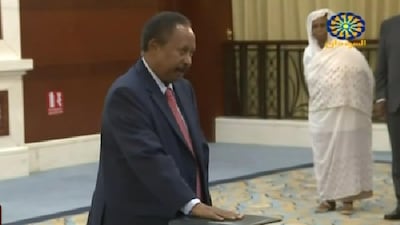Sudan's top general was on Wednesday sworn in as the leader of the military-civilian council to rule Sudan during a three-year transition before democratic elections.
Gen Abdel Fattah Al Burhan, 59, was sworn in before the country's top judge and will lead the 11-member Sovereign Council for 21 months,
He will be succeeded by a civilian leader appointed by the pro-democracy movement for the next 18 months.
Gen Al Burhan's swearing-in came after more than four months of negotiations between the ruling military council and the civilian protest movement after the army removed longtime autocratic president Omar Al Bashir in April.
The Sovereign Council was established under a power-sharing agreement between the military and protesters, amid growing concerns that the political crisis could ignite a civil war.
Gen Al Burhan chaired the Transitional Military Council.
The Sovereign Council includes five military members and five civilians appointed by the Forces of Freedom and Change, which represents the protesters.
An 11th member, a Coptic Christian judge, was appointed by the two sides.
Nine members were sworn in before the country's top judge and Gen Al Burhan on Wednesday, the official news agency Suna reported.
Aso sworn in was the country's new Prime Minister, Abdalla Hamdok.
The remaining member, Mohammed Al Taishi, will be sworn in later.
The council held its first meeting in Khartoum after the members took the oath of office.
University professor Aisha Musa, a member at the Sovereign Council, called the ceremony a "historic day" and vowed to put all of her efforts towards achieving full civilian administration.
"Your Sovereign Council has crowned your revolution, which came to achieve slogans of citizenship, peaceful coexistence, democracy and balanced development," Prof Musa said after the meeting.
Raja Issa, a Coptic Christian member of the council, said the body would start talks with armed groups to "make peace and achieve justice across the country".
Sudan has suffered rebellions in its remote provinces for decades, and the power-sharing agreement calls for the government to reach peace deals with the rebels within six months.
Among the military members on the council is Gen Mohamed Dagalo, who was deputy head of the disbanded military council.
Gen Dagalo is also the commander of the paramilitary Rapid Support Forces.
The civilian members include two women and a journalist.
The power-sharing agreement, signed on Saturday, includes a Cabinet appointed by the protest movement, which will also hold 200 seats in a 300-member legislative council to be assembled within three months.
The pro-democracy movement appointed well-known economist Mr Hamdok to lead the transitional Cabinet in a sign that overhauling Sudan's ailing economy would be a top priority.
Dozens of people waited for his arrival at Khartoum international airport chanting: "Blood for blood, even if it's civilian government."
They were calling for justice for those killed in the uprising that started late last year, initially over shortages of bread and fuel but expanding to calls for Mr Al Bashir's removal.
At least 250 people have been killed since December.
On his arrival from the Ethiopian capital Addis Ababa, Mr Hamdok said the transition period needed all efforts to unite the Sudanese and build a strong country.
The former deputy executive secretary of the UN Economic Commission for Africa since November 2011 holds a doctorate in economics from the University of Manchester in the UK.
Mr Hamdok was a senior official at Sudan's Finance Ministry in the 1980s, before the military coup in 1989 in which Mr Al Bashir took over power.
Mr Hamdok must form the Cabinet of 20 ministers at most, but the military will nominate the defence and interior ministers.
The new administration will have to adopt comprehensive reforms to the judiciary to achieve "transitional justice," said Rasha Awad, editor of the online Sudanese newspaper Altaghyeer.
Awad said the military members might impede such reforms because "it will include the armed forces and might threaten their interests".
Mr Al Bashir's trial is another challenge, she said.
The deposed former president, who has been in custody since his removal, has been charged with corruption and involvement in the killing of protesters during the popular uprising.
Mr Al Bashir is wanted by the International Criminal Court on charges of war crimes and genocide linked to the Darfur conflict in the 2000s, but the Sudanese military said it would not extradite him to The Hague.
He was the only sitting head of state for whom an international arrest warrant has been issued by the tribunal.

